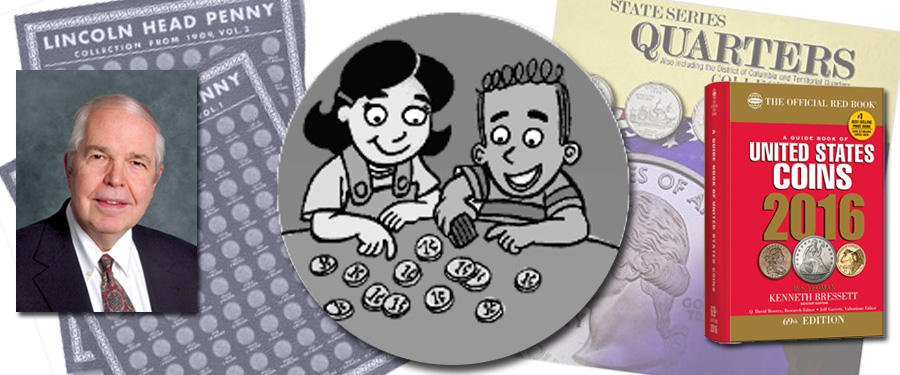
By Tom Becker
From The Coin Collector, Issue #124, March 11, 2002
Over the past couple of years I have had the pleasure of having my teenaged grandsons, John and Matthew, accompany me to numismatic conventions and other events, and even act as “interns” at Stack’s Bowers Galleries auctions. Of course, my youngest son, Andrew, has worked for the company for years, but he can hardly be considered a “kid.” Over the years, it has been a joy to watch as young numismatists discover coin collecting, especially when it leads to a lifelong endeavor. Thinking of this reminded me of an article written in 2002 by the late Tom Becker of our staff — an “infomercial” he called it at the time — about “Kids and Coins.” I reprint it here and in my next couple of blogs and encourage parents, grandparents and other collectors to consider the great benefits that can result from encouraging young people to take up numismatics.
Skills and Attributes
If you are a parent (or grandparent), you already know that the answer to the following questions is yes, yes, and yes — and more yesses!
Would you like your son or daughter, or other young person you know to acquire any of the following skills and attributes?
· Improved reading ability
· Neatness
· Improved comprehension
· Ability to set and reach goals
· Organizational skills
· Self-esteem
· Self-confidence
· Ability to establish priorities
· Pride
· Understanding of the value of money (no pun intended!)
· Enthusiasm and interest in history
· Appreciation of the American culture and tradition
· Importance of gaining specialized knowledge
What am I promising here, a Super Kid? After all, the headmaster of a leading private prep school costing, say, $30,000 to $40,000 per year, would be delighted to deliver to his students’ parents even two or three of these things, and all would be happy!
How could collecting coins accomplish all of the things I’ve mentioned? And at a low cost? And with your favorite kid having a lot of fun in the process?
Here are some of my thoughts addressing some of the attributes on the preceding list and combining some of the questions:
Improved Reading Ability
There aren’t many technical books about coins written for children. However, most general numismatic references are written in fairly simple language so the child can accept a reasonable reading challenge. The evergreen Guide Book of United States Coins, available for about $10 at your favorite bookstore (or bookstore with a coffee shop and violin music — bookstores can be nicer than ever to visit these days!), has started a lot of kids on the way to enjoying numismatics. One of Dave Bowers’ favorite recollections is that when he was a young teenager he read this book cover to cover, and he and his friend Jim Ruddy used to challenge each other with trivia games based on what they read. Who was Christian Gobrecht? What coin event happened in San Francisco in 1915?
Visiting Internet sits dealing with coins will again challenge a child to read. Reading is a necessary skill if you want to be a serious scion collector. I’ve found most children improve their reading ability when reading becomes personally important to them.
Improved Comprehension
Coin collecting has a specialized vocabulary. Even at the entry level, the collector will want to remember many specialized terms. To get the full meaning from an article the child may need to consult a dictionary. For coin collectors there is a need and a good reason to remember what’s been read. The moment a child realizes information is important he or she will find a way to remember it. You need only watch them play video games to understand this.
What the heck is an obverse? What about a motto, and what kind of mottos was used? What is a reeded edge? A restrike? A Proof coin?
Better watch out! Just as your kid probably knows the way around a computer better than you do, it won’t be long until he or she outdistances you! Who knows, he or she may ask you what, indeed, did happen at the Philadelphia Mint on August 17, 1858 (the answer is on page 284 of the 2002 edition of the Guide Book).
Organizational Skills
Coin collectors are always checking references, price lists, and information provided in catalogs, books, on the Internet, and in dozens of other places. The collector must be organized, as this trait is an important part of the hobby. It is very helpful that, unlike postcards or fossils, rare coins can be easily sorted in logical order by date and mintmark—your kid can do this after about two and one-half minutes of explanation! Afterward, organization and methodology become natural, as coins and information concerning them are added and kept up to date.
Self Confidence
Kids know the difference between learning and just spending time in school. Learning about coins can be a life-long hobby and a continual process. The child will know he or she is making progress and gathering knowledge that is both interesting and obviously valuable. It is difficult for any child to feel in control and in charge in the arena of everyday life. However, the specialty of coin collecting provides this opportunity.
More to come in two weeks! – QDB





